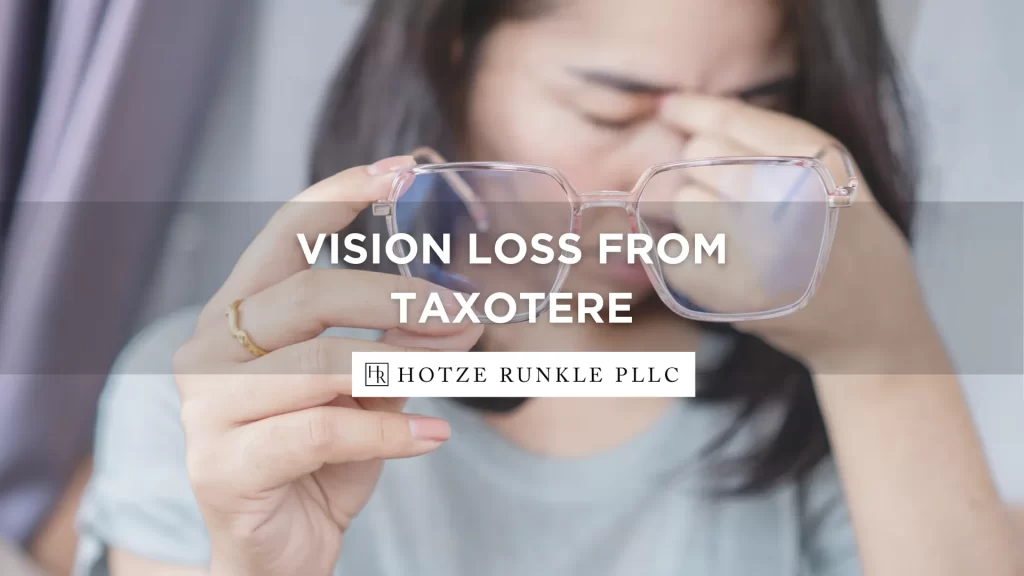
Taxotere is a chemotherapy drug that treats various forms of cancer, such as breast, stomach, prostate, and lung. It gets administered intravenously once a week, every other week, or every three weeks, depending on the chemotherapy regimen in which it’s used. It works by attacking and shrinking cancer cells to prevent them from growing.
However, studies have shown it can cause permanent eye damage, including vision loss. A commonly reported side effect of Taxotere among cancer patients is excessive eye watering and canalicular stenosis, an irreversible medical condition. Although eye watering is a side effect listed on warning labels, patients argue that it’s too vague to communicate the serious harm that can result from using the drug.
According to lawsuits filed by cancer patients and survivors throughout the country, the Taxotere manufacturer, Sanofi-Aventis, did not adequately warn doctors and patients about the danger of its chemo medication, particularly about the risk of developing canalicular stenosis.
If you treated your cancer with Taxotere and developed eye injuries, vision loss, canalicular stenosis, or another eye-related condition, do not hesitate to call the Taxotere side effects lawsuit attorneys of Hotze Runkle PLLC at (800) 763-6155 for a free consultation. We might be able to represent you in a lawsuit against the negligent manufacturer.
Adverse Effects of Taxotere Chemotherapy Treatment
Many patients report epiphora, excessive eye watering, after starting chemotherapy with Taxotere. The treatment schedule does not impact the risk of experiencing this side effect. Eye-watering can occur whether a patient receives the drug once a week or once every three weeks.
Secretions from the drug interact with a person’s tears, causing inflammation of the canaliculus. Chronic inflammation causes obstructions, blocking tears from funneling into the nasal cavity as usual. Although allergies and the common cold can also lead to epiphora, the symptom usually resolves on its own in those situations. When epiphora results from Taxotere, watery eyes and other symptoms appear, requiring medical intervention.
Obstructions eventually cause the canaliculus to close partially or completely. Canalicular stenosis can develop and cause various symptoms, such as:
- Chronic eye infections
- Swollen eyelids
- Headaches
- Light sensitivity
- Central vision loss
- Clouded eye lens
- Blurry vision
Although canalicular stenosis is a permanent condition with no known cure, there are treatment options that might help manage symptoms. You must talk to your doctor at the first sign of epiphora to try to reduce the risk of permanent obstructions forming in your canaliculi and leading to the debilitating condition.
How Does Taxotere Cause Canalicular Stenosis?
Chemotherapy causes various adverse side effects. Cancer patients are well aware of the risks they can encounter during treatment. However, they did not know eye damage and vision issues were side effects of Taxotere. Many doctors and patients were unaware of the harm the drug could cause because the manufacturer chose not to disclose the risks.
As Taxotere travels throughout the body, it directly contacts fluids, including tears. Secretions from the drug interact with the tears, leading to chronic inflammation and infections. Obstructions start to form in the canaliculus, eventually causing permanent blockages. When the tears can’t drain into the nasal cavity, there is nowhere else for them to go except to collect on the eye’s surface.
The canaliculi can start to close from the blockages. Once that happens, nothing can open them back up unless you’re willing to undergo invasive surgery.
Treatment Options for Canalicular Stenosis
You can’t cure canalicular stenosis. However, there are two surgical options to minimize the frequency and severity of your symptoms. One surgery is dacryocystorhinostomy (DCR). A surgeon cuts into the space between the eye and nose to fuse adjacent structures below the skin’s surface. This creates an artificial tunnel for tears to flow through instead of getting trapped behind the damaged canaliculus.
Some people aren’t eligible for DCR due to the severe damage to the canaliculus and nearby structures preventing surgeons from creating an artificial passageway. Conjunctivodacryocystorhinostomy (CDCR) is an alternative option to create the tunnel necessary to facilitate the flow of tears around the obstructed canaliculus. Instead of fusing adjacent structures, the surgeon places a tiny glass tube called a Jones tube over the closed canaliculus so tears can drain into the nasal cavity as usual.
Although these surgeries can prevent excessive eye watering and alleviate other symptoms, both come with serious risks, such as:
- Migrating Jones tube
- Blindness
- Facial scarring
- Nerve and tissue damage
- Sinusitis
- Eye infections
- Uncontrollable hemorrhaging during and after surgery
Compensation for Eye Injuries from Taxotere
You might be able to file a lawsuit against Sanofi for your vision loss, canalicular stenosis, or another condition you developed from Taxotere chemotherapy. The money you receive could compensate you for your:
- Loss of or diminished quality of life
- Hospitalization, prescriptions, surgeries, and other medical expenses
- Pain and suffering
- Lost wages
- Lost earning capacity
- Mental anguish
You might also recover punitive or exemplary damages. This financial award punishes the defendant for their actions. You must provide clear and convincing evidence of the manufacturer’s gross negligence or egregious misconduct for the court to award you punitive or exemplary damages.
Eligibility for a Taxotere Lawsuit
 You might qualify to file a lawsuit against Sanofi if you received Taxotere during chemotherapy treatments and experienced eye-related damage or injury, such as:
You might qualify to file a lawsuit against Sanofi if you received Taxotere during chemotherapy treatments and experienced eye-related damage or injury, such as:
- Loss of vision
- Blocked tear ducts
- Eye surgery
- Swelling in and around the eyes
- Eye irritation
- Excessive eye watering
- Narrowing of the tear ducts
- Dry eyes
- Blurry vision
Seek Justice with Help from Hotze Runkle PLLC
Hotze Runkle PLLC understands how devastating it can be to discover a drug meant to treat your cancer might have contributed to additional medical issues. Developing a severe and permanent eye condition like canalicular stenosis can significantly affect your daily routine and quality of life.
You might be unable to work, care for your family, and perform basic tasks. Sanofi should be liable for the suffering you endured. Our legal team is ready to represent you and fight for the maximum compensation you deserve.
If you developed canalicular stenosis, epiphora, or another adverse side effect of Taxotere during or after Taxotere chemo, call us at (800) 763-6155 for a free consultation or take our quiz to find out if you qualify for a Taxotere lawsuit.